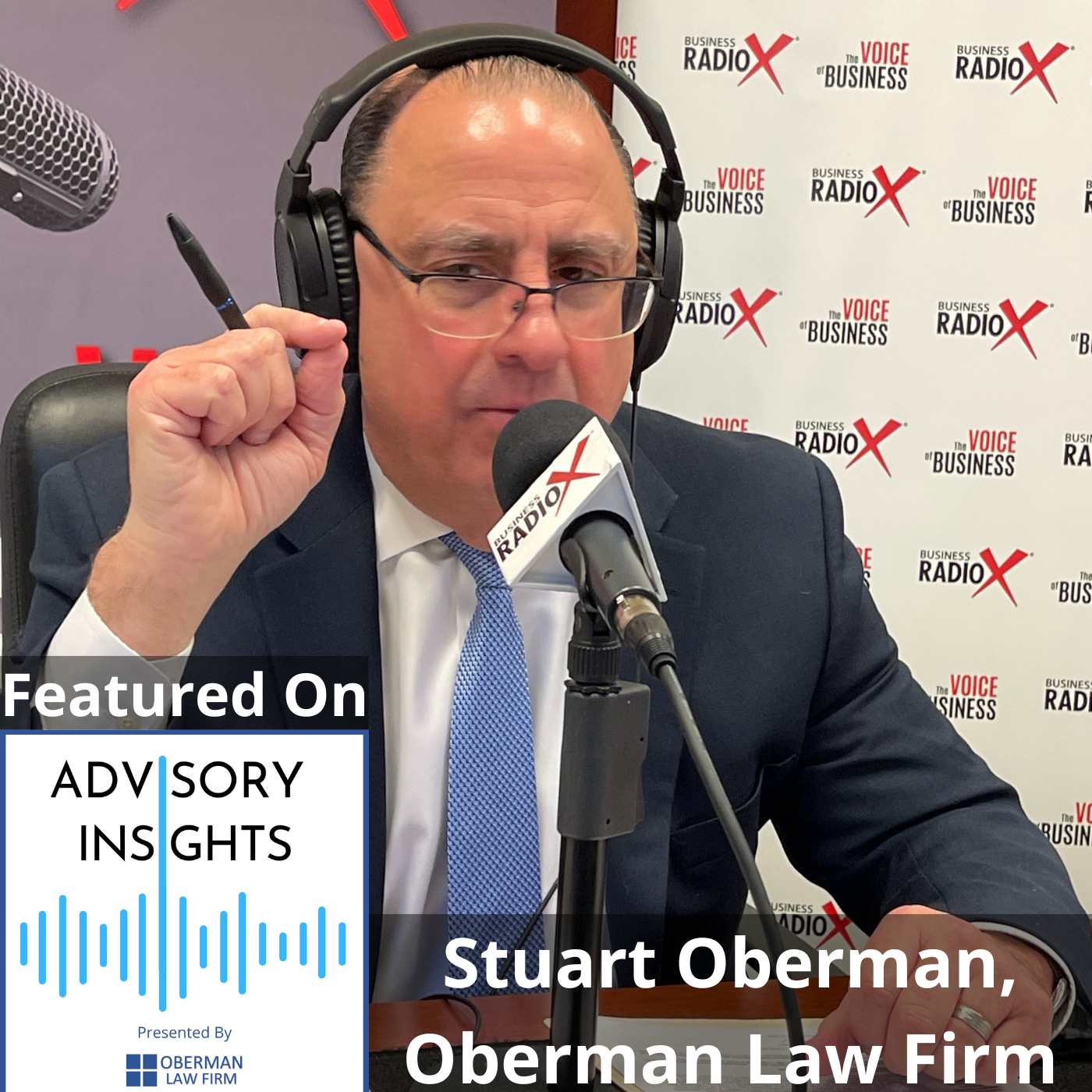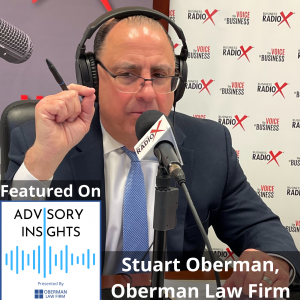
Corporate Internal Investigations (Advisory Insights, Episode 37)
On this episode of Advisory Insights, Stuart Oberman of Oberman Law Firm discusses the do’s and don’ts of corporate internal investigations. Stuart covers topics such as the importance of developing an effective internal investigation process, handling whistleblowers and their complaints, expectations for reporting and documentation for compliance initiatives, and ethical considerations, and much more.
Advisory Insights is presented by Oberman Law Firm and produced by the North Fulton studio of Business RadioX®. The series can be found on all the major podcast apps. You can find the complete show archive here.
TRANSCRIPT
Intro: [00:00:02] Broadcasting from the studios of Business RadioX, it’s time for Advisory Insights. Brought to you by Oberman Law Firm, serving clients nationwide with tailored service and exceptional results. Now, here’s your host.
Stuart Oberman: [00:00:20] And welcome everyone to Advisory Insights. Stuart Oberman here. And I want to talk a little bit about small, medium, large-sized businesses. The title of today’s podcast is Corporate Internal Investigations: Do’s and Don’ts.
Stuart Oberman: [00:00:37] At some point, no matter what size company you are, you are going to have to investigate something internally. It could be a big problem. It could be a small problem. But at some point, you’re going to have to investigate a certain course of conduct. Now, our clients range anywhere from small to global, so we’ve really had a wide, wide range of investigations that we do all the way from fraud, to Department of Justice matters, to felonies, white collar crime.
Stuart Oberman: [00:01:16] And I want to cover a couple of things because there’s rules regarding corporate compliance and oversight that you have to know. Again, it doesn’t matter whether you’re small, medium, large, but you have to be able to promote and maintain an ethical corporate culture no matter how small or big you are, because it is paramount and the complexities are so integral that, again, it’s the same scenario no matter what size you are. So, I don’t care how big you are, you need to develop or have some kind of structure for the development of an effective internal investigation process.
Stuart Oberman: [00:02:01] So, when you start this process and you have a compliance program, again, you got five employees or 500 or 5,000, it doesn’t matter. We’re talking basics here. Every business with employees should have a compliance program.
Stuart Oberman: [00:02:19] And what are the expectations of the reporting and documentation for compliance initiatives? All kind of Federal, you got OSHA, you got HIPAA for medical, State, Federal, we got all kinds of regulatory matters that you just have to know. What are the risk assessments? How do you develop the internal investigations? What do you involve in white collar prosecutions? What’s the evolving role of your board, if you have a board, if you’re that big? So, you’ve got all kinds of considerations.
Stuart Oberman: [00:02:53] And I want to take a look at the start of the internal investigations. Again, I don’t want to go down a rabbit hole with these because it really, really can, but I want to get some basics down on the wire, if you will.
Stuart Oberman: [00:03:04] So, first, you got to decide whether or not you’re going to conduct an internal investigation. What is done? What’s the extent? And how deep do you need to roll with that? When you start the investigation, first and foremost, you have to define a goal. What is the end result you want to achieve? How do you get there? How do you gather the evidence? How do you interview the employees? Are the employees under the corporate attorney-client privilege? Have you instructed them to get their own counsel? And then, who do you report to? What is the reporting requirements? Are the reporting requirements attorney-client privileged?
Stuart Oberman: [00:03:44] If you’re investigating someone or something on behalf of a corporation, who’s your client? You have to define that because that may determine whether or not your results are discoverable. Discoverable. And who do you disclose the investigation reports to? Is it a person or, again, a board? Or is it an outside auditor who’s hired you? Is it the business’ CPA?
Stuart Oberman: [00:04:18] Again, all areas you need to look at. You have to have a blueprint with this. You can’t just go in blind and start swinging the hammer in investigations because that will absolutely end in a disastrous result.
Stuart Oberman: [00:04:33] So, first and foremost, we’ve also got to take a look at the corporate compliance governing employment and privacy laws. Does the company have a code of ethics? If not, I would encourage you to draft a code of ethics. Is it a form? Is it a holistic approach? That’s an individual corporate matter. But you have to have a corporate code of conduct. I don’t care how big you are, you have to define.
Stuart Oberman: [00:05:01] And this goes back to my earlier podcast, and I speak so many times, do so many podcasts, Where is your employee manual? This all leads up to what the employee manual is. I want you to take a look at your code of conduct regarding discrimination, harassment, business gifts, restrictive covenants, non-competes. Goodness gracious, the whole world is going against non-competes. We got the FTC. We got the National Labor Relations Board. What is your conduct?
Stuart Oberman: [00:05:35] Do you have a drug free workplace policy? What happens if you have an employee that goes into a state that is marijuana or cannabis friendly, what do you do? How do you deal with it? How do you investigate that?
Stuart Oberman: [00:05:50] Whistleblower. So, you’re asking, “Stuart, what’s a whistleblower?” So, is there a person in your organization who reports to you or to the Federal Government, State Government problems, irregularities, or violations? And do you have a hotline for that? So, you got 20 employees and you have an employee who wants to report something to you. Obviously, if you’re the owner of the business, they’re going to be very, very hesitant about coming to you. My suggestion would be to have an anonymous hotline for company code of conduct violations.
Stuart Oberman: [00:06:33] Next question is data security. Where are you storing that sensitive data that if leaked, if hacked, if discovered can have a damaging, damaging effect on your business? So, again, privacy laws, data compliance, what platform, how secure is that?
Stuart Oberman: [00:06:54] So then, I want to take a look at some some really ethical considerations in any kind of investigation. Ethical considerations. So, you’ve got conflict management, you’ve got employees, and then you’ve got corporations. Who was your client? Is it the employees? What if your employees that you’re interviewing have some very, very negative things to say about the corporation, what do you do with the information? Who are you representing?
Stuart Oberman: [00:07:23] Is the information that you receive subject to attorney-client privilege? That, you’ve got to know right off the bat who your client is, because that will determine how you process information, how much is that protected. And then, how do you ethically manage your corporate clients or your outside client, how do you manage those? What’s the guidelines? So then, what are your ethical considerations in the internal investigation?
Stuart Oberman: [00:07:50] And these are all questions, and I’ve given you guys more questions than answers because these things I want you to consider. I want you to review managing multiple jurisdiction employment compliance initiatives. What if you have ten locations in different states? What are your handbooks? Are you a global company or local? Code of Conduct, hotline, HR Policies? Goodness gracious, I probably did a million podcasts regarding HR cross border matters.
Stuart Oberman: [00:08:27] Benefits, equity, and what are your incentive plans for reporting violations, if there are any HR issues? In a merger and acquisition and you discover things after the fact, how do you deal with that? How do you divest yourself of that information? And, again, I’ll go back to data privacy laws. Where is that information kept?
Stuart Oberman: [00:08:52] Folks, that’s a lot of information. Again, a lot of times on some podcasts, I’m giving you more information than I’m asking. But in this case, I’m asking much more information because I want you to understand the ramifications if you don’t go into these investigations with a clear blueprint of where you’re at, where you’re going, who your clients are, what’s the data, how is it going to be handled, how is it stored, what’s the end result.
Stuart Oberman: [00:09:21] Folks, that’s our podcast for today. Stuart Oberman here, Advisory Insights. Thank you so much for joining us. If you need to reach us, please feel free to give us a call, 770-886-2400, or email, stuart, S-T-U-A-R-T, @obermanlaw.com. Thanks everyone and have a fantastic day.
Outro: [00:09:43] Thank you for joining us on Advisory Insights. This show is brought to you by Oberman Law Firm, a business-centric law firm representing local, regional, and national clients in a wide range of practice areas, including health care, mergers and acquisitions, corporate transactions, and regulatory compliance.
About Advisory Insights Podcast
Presented by Oberman Law Firm, Advisory Insights Podcast covers legal, business, HR, and other topics of vital concern to healthcare practices and other business owners. This show series can be found here as well as on all the major podcast apps.
Stuart Oberman, Oberman Law Firm

Stuart Oberman is the founder and President of Oberman Law Firm. Mr. Oberman graduated from Urbana University and received his law degree from John Marshall Law School. Mr. Oberman has been practicing law for over 25 years, and before going into private practice, Mr. Oberman was in-house counsel for a Fortune 500 Company. Mr. Oberman is widely regarded as the go-to attorney in the area of Dental Law, which includes DSO formation, corporate business structures, mergers and acquisitions, regulatory compliance, advertising regulations, HIPAA, Compliance, and employment law regulations that affect dental practices.
In addition, Mr. Oberman’s expertise in the healthcare industry includes advising clients in the complex regulatory landscape as it relates to telehealth and telemedicine, including compliance with corporate structures, third-party reimbursement, contract negotiations, technology, healthcare fraud, and abuse law (Anti-Kickback Statute and the State Law), professional liability risk management, federal and state regulations.
As the long-term care industry evolves, Mr. Oberman has the knowledge and experience to guide clients in the long-term care sector with respect to corporate and regulatory matters, assisted living facilities, and continuing care retirement communities (CCRCs). In addition, Mr. Oberman’s practice also focuses on healthcare facility acquisitions and other changes of ownership, as well as related licensure and Medicare/Medicaid certification matters, CCRC registrations, long-term care/skilled nursing facility management, operating agreements, assisted living licensure matters, and health care joint ventures.
In addition to his expertise in the healthcare industry, Mr. Oberman has a nationwide practice that focuses on all facets of contractual disputes, including corporate governance, fiduciary duty, trade secrets, unfair competition, covenants not to compete, trademark and copyright infringement, fraud, and deceptive trade practices, and other business-related matters. Mr. Oberman also represents clients throughout the United States in a wide range of practice areas, including mergers & acquisitions, partnership agreements, commercial real estate, entity formation, employment law, commercial leasing, intellectual property, and HIPAA/OSHA compliance.
Mr. Oberman is a national lecturer and has published articles in the U.S. and Canada.
Oberman Law Firm
Oberman Law Firm has a long history of civic service, noted national, regional, and local clients, and stands among the Southeast’s eminent and fast-growing full-service law firms. Oberman Law Firm’s areas of practice include Business Planning, Commercial & Technology Transactions, Corporate, Employment & Labor, Estate Planning, Health Care, Intellectual Property, Litigation, Privacy & Data Security, and Real Estate.
By meeting their client’s goals and becoming a trusted partner and advocate for our clients, their attorneys are recognized as legal go-getters who provide value-added service. Their attorneys understand that in a rapidly changing legal market, clients have new expectations, constantly evolving choices, and operate in an environment of heightened reputational and commercial risk.
Oberman Law Firm’s strength is its ability to solve complex legal problems by collaborating across borders and practice areas.
Connect with Oberman Law Firm:
Company website | LinkedIn | Twitter
















